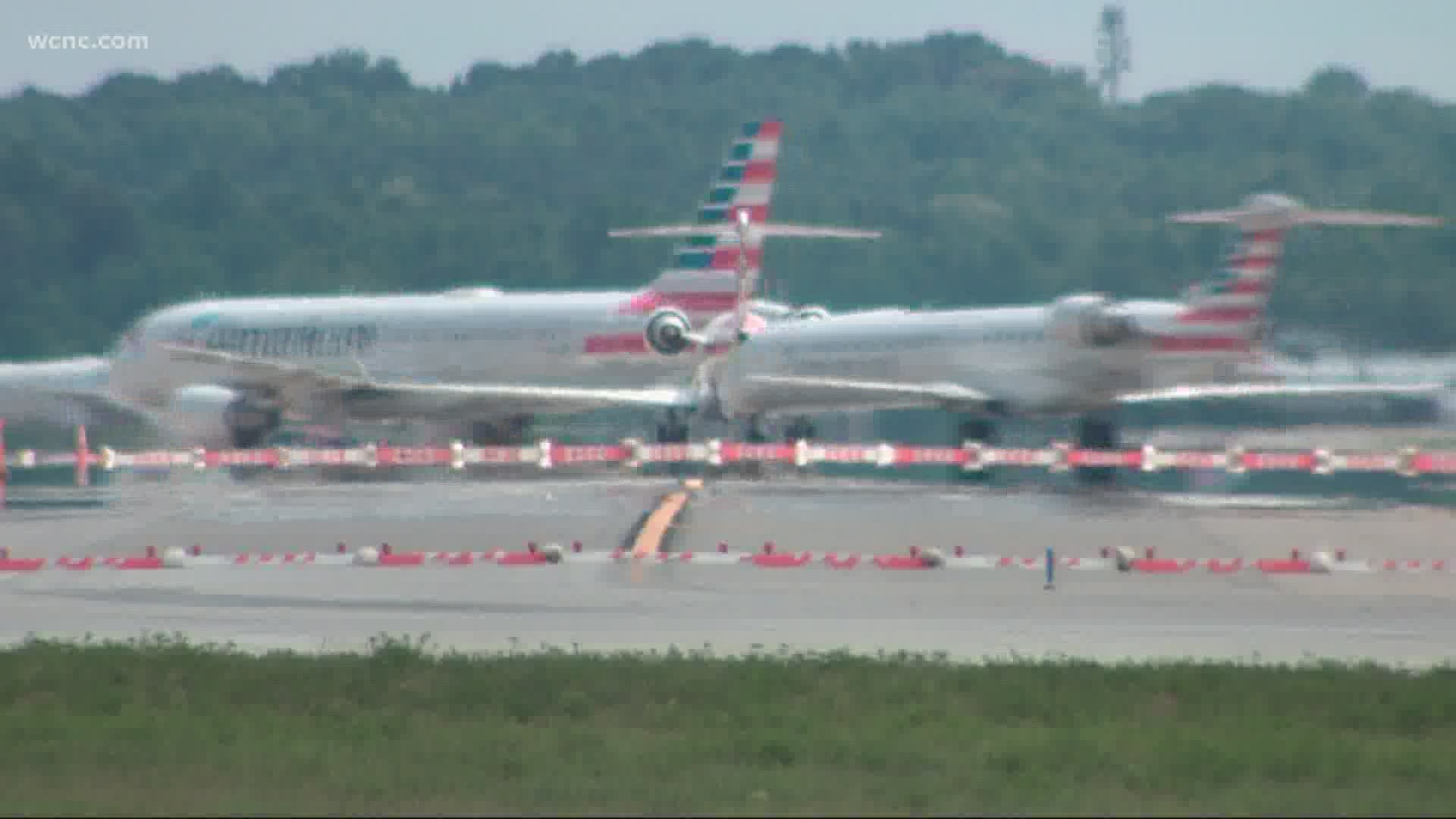CHARLOTTE, N.C. — At a time when every penny of government help is critical, some of our country's smallest airports, including two in North Carolina, recently received enough grant money to fully operate for several years.
Aviation consultant Mark Sixel said a flawed formula approved by Congress resulted in uneven funding.
"All things were not equal," Sixel said. "It wasn't fair the distribution of the funds."
Federal Aviation Administration data show the nation's largest airports, like Charlotte Douglas International, received the most money from the Coronavirus Aid Relief and Economic Security (CARES) Act, but CLT's $135 million allocation won't even fund a full year of operations.
Meanwhile, federal records show four hours east, two airports have enough funding to last several years.
The much smaller Pitt-Greenville County Airport, home to just five arrivals and five departures a day to and from Charlotte during normal times, received $18 million in CARES Act money. Executive Director Bill Hopper said the pandemic has crippled the community airport, resulting in a 95% decline in passenger numbers.
"I was very worried quite frankly before the grant came through," Hopper said. "We just had a few months of cash to operate on. This money is very much needed."
With zero debt, the funding is enough to cover more than three years of operations. Hopper said the money will keep the essential airport, often used for medical transport, open.
"I felt somewhat relieved quite frankly," Hopper said about his reaction when he found out the government approved the airport's grant application. "It's good to know that we do have something coming our way so that we can keep this place operational."
"You don't feel like this amount was excessive in any way?" WCNC asked.
"No, we have operating money that we're in need of," Hopper replied.
Just southeast in New Bern, the FAA originally allocated even more money to Coastal Carolina Regional, which reported a 96% decline in passenger traffic.
Airport Director Andy Shorter said the federal government has since trimmed the grant by about $4 million to a total that now equals $14.7 million, which is the equivalent of four years of operating expenses.
"The federal government makes large capital investments in commercial service airports and this CARES Act funding allocation for EWN will ensure that their prior investments are protected and will continue providing returns critical for the citizens of and travelers to Eastern NC," Shorter added.
Sixel said one of the formulas used for determining the allocations relied on a ratio of unrestricted cash to debt service and as a result, gave smaller airports with some cash and no debt too much weight.
"It does raise a red flag, because the intent of the CARES Act was not to fund airports for an indefinite period of time," Sixel said.
"Do you think four years' worth of money is necessary right now?" WCNC asked him.
"I still don't think that's necessary," Sixel replied.
He said the uneven funding gives certain airports a better shot at recovery than others.
For example, he said Albert J. Ellis Airport in Jacksonville is at a competitive disadvantage because it only received $3 million compared to Coastal Carolina and Pitt-Greenville.
"It's unfair," he said.
Rep. Steve Cohen (D) of Tennessee sent a letter to the FAA last month expressing concerns.
"I was disappointed to learn that the funding has been disproportionally awarded to several smaller, less trafficked airports..." the member of the House Committee on Transportation and Infrastructure said in his letter. "..."For instance, the Devils Lake Regional Airport in North Dakota received $16.9 million, which is enough to sustain its current operations for 50 years. The Mason City Municipal Airport in Mason City, Iowa, received $17.5 million, which is enough to sustain its operation for 29 years. And, the Barnstable Municipal Airport in Hyannis, Massachusetts, received $18 million, which is double the airport's planned Fiscal Year 2021 budget. The purpose of the CARES Act emergency relief is to support U.S. airports that are experiencing severe economic disruption caused by the COVID-19 public health emergency, not to bolster or double smaller airports' budgets based on an arbitrary formula."
In a statement, the FAA said the agency prepared for the potential of outliers and planned accordingly.
"The CARES Act divided the available funds into separate components, allocated based on a formula that reflects debt service, unrestricted airport reserves and enplanements (passenger boardings)," the agency said in part. "When using any large dataset and formula, an anomaly might occur, so the FAA prepared for that possibility. In cases where an airport's allocation would provide more than four years' worth of operating expenses, the FAA will cap the initial grant amount at that level. If an airport can demonstrate that it can use more of the allocated amount within the four-year timeframe, the airport sponsors may work directly with the appropriate Airports District Office."
CLT is an airport with a $191.3 million annual operating expense budget. Airport management welcomed the $135 million in CARES Act funds the airport received "to help offset revenue declines caused by drastic reductions in air travel due to the COVID-19 pandemic."
Aviation Director Brent Cagle said with enplanements at just 5% of its 2019 level, the emergency grant will preserve jobs for now and help the airport's expected months-long recovery.
"There are still 10,000 to 15,000 people utilizing the airport daily," he said in a statement. "They could be doctors. They could be people trying to get back home, if they were stranded during this crisis. They are traveling because they need to travel. The airfield and the terminal are imperative for us to sustain those operations."
MORE ON WCNC CHARLOTTE:

